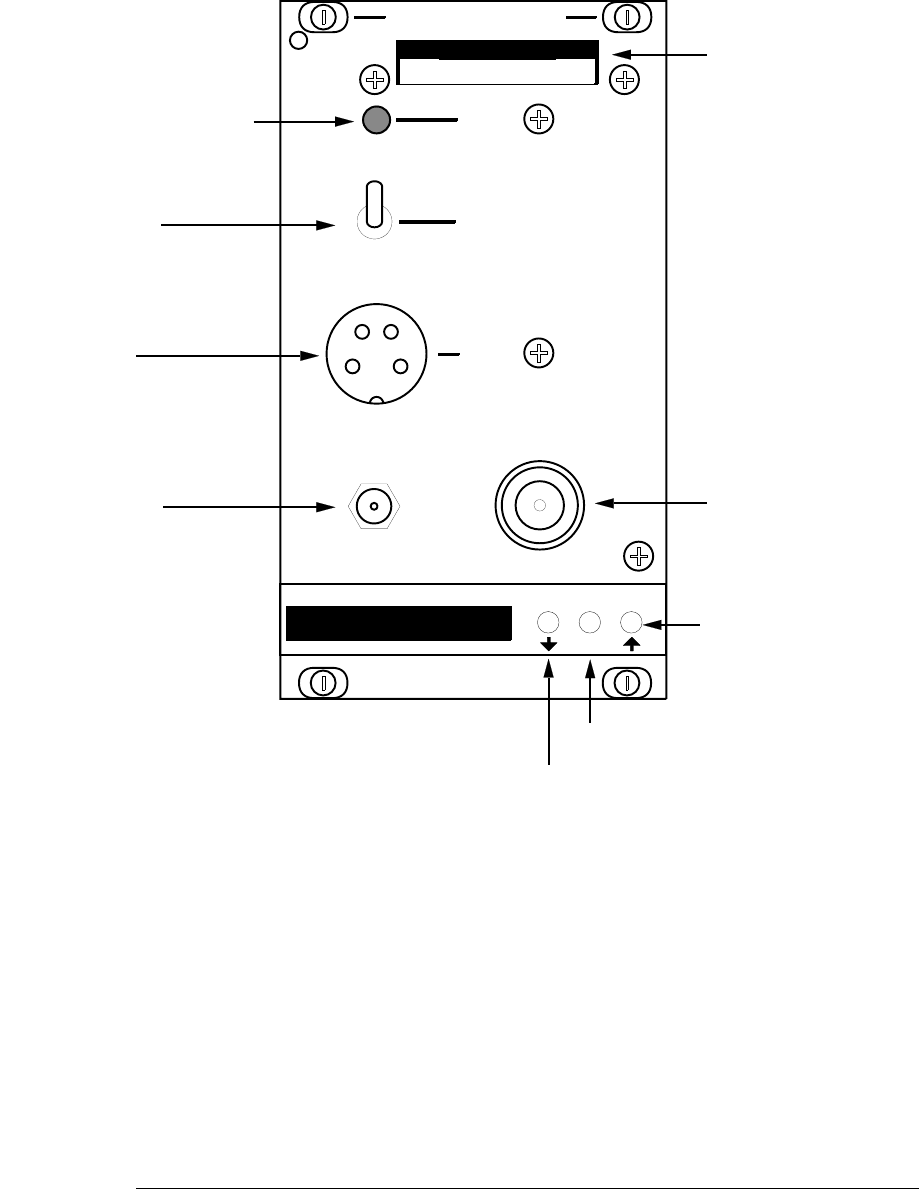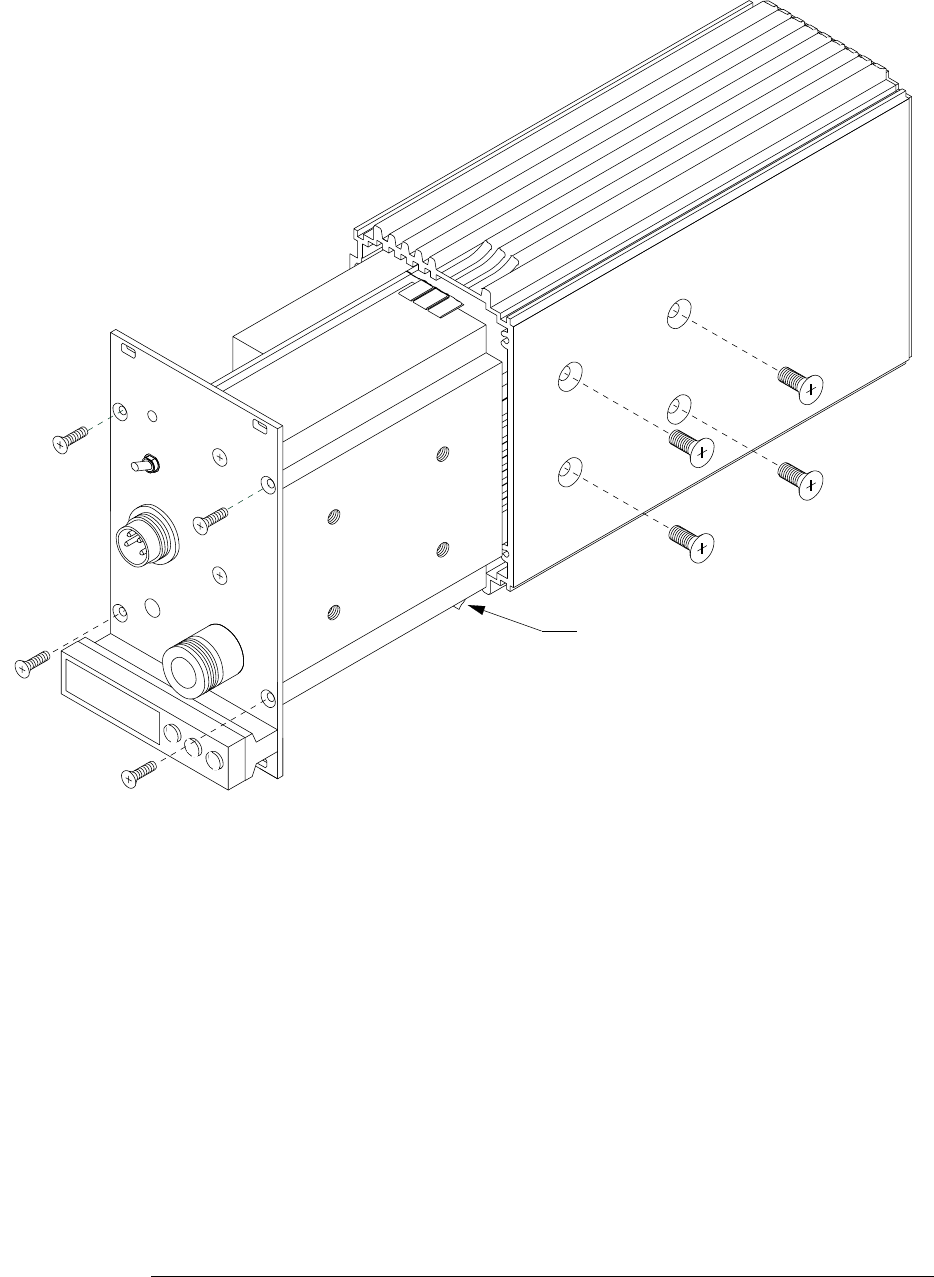Codan Radio Communications VT-3A130-S-FSH Transmitter User Manual VHF AM Transmitter Instruction Manual
Codan Radio Communications Transmitter VHF AM Transmitter Instruction Manual
Contents
VHF AM Transmitter Instruction Manual

DANIELS
ELECTRONICS LTD.
TM
MT-3 RADIO SYSTEMS
VHF AM TRANSMITTER
INSTRUCTION MANUAL
VT-3AM
118 - 138 MHz
Covers Family Model: VT-3A130-SYD410
Copyright © 2000 Daniels Electronics Ltd. All rights reserved. No part of this publication may be
reproduced, stored in a retrieval system or transmitted in any form or by any means, electronic,
mechanical, photocopying, recording or otherwise, without the prior written consent of Daniels
Electronics Ltd.
DE™ is a registered trademark of Daniels Electronics Ltd. registered in the United States Patent and
Trademark Office.
Issue: 2 Previous Issue: 1
Issue Date: March 2000 Previous Issue Date: May 1997 Daniels Electronics Ltd.
Printing Date: March 2000 Victoria, BC.
Part No.: IM22-VT3A130 PRINTED IN CANADA

DE DANIELS
ELECTRONICS
ii VT-3A130 VHF AM Transmitter Instruction Manual
Reviewed By:
Quality Assurance:
Claudia
Borman
_________________
Name Signature Date
NOTE:
The user's authority to operate this equipment could be revoked through any
changes or modifications not expressly approved by Daniels Electronics Ltd.
The design of this equipment is subject to change due to continuous
development. This equipment may incorporate minor changes in detail from the
information contained in this manual.

DE DANIELS
ELECTRONICS
VT-3A130 VHF AM Transmitter Instruction Manual iii
TABLE OF CONTENTS
Page
1 GENERAL..................................................................................... 1-1
1.1 Introduction.............................................................................. 1-1
1.2 Manual Organization.................................................................... 1-1
1.3 Performance Specifications ............................................................ 1-2
1.3.1 Transmitter Specifications........................................................... 1-2
1.3.2 Audio Specifications................................................................. 1-4
1.3.3 Physical Specifications .............................................................. 1-4
2 SYSTEM OVERVIEW....................................................................... 2-1
2.1 Transmitter Operation................................................................... 2-1
2.2 Frequency Selection .................................................................... 2-2
2.2.1 BCD Switch Option.................................................................. 2-2
2.2.2 Frequency Select Handle Option. .................................................. 2-2
2.3 Transmitter Assembly and Alignment ................................................ 2-3
2.3.1 Complete Transmitter Alignment................................................... 2-3
2.3.2 Output Power Adjustment........................................................... 2-3
2.4 Recommended Test Equipment List .................................................. 2-4
2.5 Repair Note .............................................................................. 2-4
2.6 Printed Circuitboard Numbering Convention........................................ 2-4
3 ILLUSTRATIONS ........................................................................... 3-1
3.1 MT-3 Transmitter Front Panel......................................................... 3-1
3.2 MT-3 Transmitter Case - Exploded View ............................................ 3-2
4 REVISION HISTORY ....................................................................... 4-1
MODULE MANUALS
MT-3 AM Transmitter Main Board Instruction Manual ............IM22-MT3AMTXMN
VT-3A130 Amplifier Instruction Manual .............................IM22-VT3A130AMP
Enhanced AM/FM Synthesizer Instruction Manual .......................... IM10-OS3AH
VHF AM Transmitter Channel Designation Tables ................... IM12VRT3A130CT
Frequency Select Handle Instruction Manual....................................IM12-FSH3

DE DANIELS
ELECTRONICS
iv VT-3A130 VHF AM Transmitter Instruction Manual
This Page Intentionally Left Blank

DE DANIELS
ELECTRONICS
VT-3A130 VHF AM Transmitter Instruction Manual 1-1
1 GENERAL
1.1 Introduction
The VT-3A130 Transmitter is a synthesized multichannel AM transmitter designed to interface with
the MT-3 Repeater Systems, while still maintaining MT-2 system compatibility. Both MT-3
systems are characterized by dependable low maintenance performance under the most severe
environmental conditions. All performance measurements comply with Industry Canada (IC)
Standard Specification RSS 119 and 140, as well as the Federal Communications Commission
Part 87 for AM equipment. In addition, all units are burnt-in for 24 hours and are accompanied by
a complete test report.
The VT-3A130 Transmitter operates in the 118 - 138 MHz aviation band. The transmitter's
frequency stability is controlled by an OST-3A128 Synthesizer. The synthesizer module can be
programmed to have up to 16 channels. A channel programmer can preprogram the first 15
channels; channel 16 can be programmed from the front panel and channel 1 can be programmed
by the four BCD switches located on the MT-3 AM Transmitter Main Board.
1.2 Manual Organization
The organization of this manual reflects the modular makeup of the VT-3 product line. Each
module is fully described within its respective submanual, all of which are contained within this
document. In general, each submanual contains:
1. A functional description and specification summary.
2. A detailed technical description (Theory of Operation).
3. Assembly, setup and alignment procedures relevant to that particular module.
* Note * Material presented in a given "sub-manual" may include information related to other
module versions not directly applicable to the VT-3A130 transmitter family. The OS-3H
synthesizer module is a prime example, having family members covering from 29 to 512 MHz.

DE DANIELS
ELECTRONICS
1-2 VT-3A130 VHF AM Transmitter Instruction Manual
The following sub-manuals are contained within this document cluster:
AM
Transmitter
Manua
l:
This manual provides an overview of the complete transmitter, manual
organization and assembly in terms of the other modules.
MT-3AM
Transmitter
Main
Board:
This manual pertains to the AM audio processor module,
transmitter Main Board and Front Panel Board. Most of the user selectable options are accessed
within the Transmitter Main Board module, including channel selection. Since all external
connections (including power and signal lines) are made to the Transmitter Main Board, most of
the material pertaining to transmitter operation and installation is found here.
VT-3A130
Amplifier:
The amplifier module provides the final stages of RF power amplification
and harmonic filtering for the transmitter. This manual is intended primarily as a reference for
frequency changes since the amplifier module is adjusted at the factory.
Enhanced
AM/FM
Synthesizer:
This manual provides information on alignment and operation of
the Enhanced Synthesizer Module. Channel selection is described in the 'Transmitter Main Board”
Manual.
VHF
AM
Transmitter
/
Receiver
Channel
Designation
Tables:
This manual relates operating
frequency to the transmitter channel number (see section 2.1).
Frequency
Select
Handle
Instruction
Manual:
This manual provides information on how to
program the synthesizer channels from the front panel.
1.3 Performance Specifications
1.3.1 Transmitter Specifications
Type: MT-3 Series Transmitter
Family: VT-3A130
Compatibility: MT-2 Series and MT-3 Series Radio Systems
Frequency Range: 118 - 138 MHz
RF Power Output: 1.0 - 4.0 Watts adjustable (carrier only)
Frequency Generation: Synthesized (internal plug-in module)
Channel Spacing: 25 kHz (8.333 kHz)
System Impedance: 50 Ω; Type N (Standard)

DE DANIELS
ELECTRONICS
VT-3A130 VHF AM Transmitter Instruction Manual 1-3
Duty Cycle: 100%; Continuous operation from -30°C to +60°C. (- 40°C
Optional)
Spurious and Harmonic Emissions: More than 90 dB below carrier
Key-On/Key-off Spectral Mask Transients are at least 80 dBc below for frequencies
±400 kHz from carrier.
Input VSWR: 2.8:1 Maximum.
Load VSWR tolerance: Z load = 20:1:
Modulation: 6K00A3 Amplitude Modulation
Transmitted Noise More than 45 dBc below carrier
Operating Temperature Range: -30˚C to +60˚C, optional - 40˚C temperature test.
Operating Humidity: 95% Relative Humidity (Non-condensing) at
+25°C
Operating Voltage: +13.8Vdc Nominal (range +10 Vdc to +17 Vdc)
Active Current: +13.8 Vdc supply less than 1.5 A at Pout = 4 Watts
Channel Selection: In 25kHz (8.333 kHz) increments selected by two front
panel buttons. Preset capability for 15 channels selectable
through external control.
Frequency Stability: Standard: ±1ppm -30°C to +60°C (optional -40˚C)
Standby Current (9.5Vdc) and Rise time: Typ. 20 mA/30ms MODE 1
(Also see Transmitter Typ. 17 mA/50ms MODE 2
Main Board Specification)
FCC Type Approval: TBA
DOC Type Approval: TBA
Front Panel Control: One 3 position switch
• NORM (repeat mode)
• OFF
• KEY TX
PTT Activation: • Active to ground with time-out timer
• Active to ground without time-out timer
• Microphone activated without time-out timer
• Front Panel switch (KEYED) without time-out
timer, (NORM) with or without time-out-timer.
PTT Time-Out-Timer: Selectable 1 seconds to 8 hours. (factory set 5min)

DE DANIELS
ELECTRONICS
1-4 VT-3A130 VHF AM Transmitter Instruction Manual
1.3.2 Audio Specifications
Audio Input: -25 to 0 dBm into a 600Ω balanced load
Audio Response: Flat audio; +1/-3 dB: 300 Hz - 3 kHz
Audio Distortion: Less than 3% -40˚C to +60˚C at 30% modulation
Less than 5% -40˚C to +60˚C at 90% modulation
1.3.3 Physical Specifications
Physical Dimensions: Width: Height: Depth:
7.1 cm (2.8 in) 12.8 cm (5.05 in) 19 cm (7.5 in)
Module Weight: 1.4 kg (3.0 lb.)
Corrosion Prevention: Anodized aluminum construction. Stainless steel hardware.
Selectively conformal coated glass epoxy 2 and 4 layer
printed circuitboards. Gold plated module connectors.
Module Design: Compact Eurostandard modular design. Plug-in modules
mate with Daniels standard M3 repeater subrack. Subracks /
modules comply with IEEE 1101, DIN 41494 and IEC 297-
3 (mechanical size / modular arrangement).
External Connections: RF Connection: type N connector located on the transmitter
module front panel. Motherboard Connections (Audio,
Power, and Control) are made through a 48 pin, gold plated,
type F connector on the rear of the transmitter module. User
connection made through mated "mother board" assembly of
the repeater subrack. Type F standard connector complies
with DIN 41612 Level 2 (200 mating cycles, 4 day 10 ppm
SO2 gas test with no functional impairment and no change in
contact resistance).

DE DANIELS
ELECTRONICS
VT-3A130 VHF AM Transmitter Instruction Manual 2-1
2 SYSTEM OVERVIEW
2.1 Transmitter Operation
Several modules are integrated by the VT-3A130 Transmitter Main Board to provide the complete
transmitter. The Front Panel Board and AM Audio Processor are soldered directly to the
Transmitter Main Board and are treated collectively in the Transmitter Main Board Manual while
the Power Amplifier and and the Frequency Synthesizer plug into the Transmitter Main Board and
can be changed with minimal effort. Circuitry and jumpers on the Transmitter Main Board control
the operation of all modules and the operation of the transmitter, overall. Technical details and a
complete description of transmitter operation can be found in the Transmitter Main Board Manual.
The VT-3A130 transmitter requires two power supplies; a regulated + 9.5 Vdc supply and
+ 13.8 Vdc supply, the later of which is connected only to the Amplifier Module. The (nominally)
+13.8 Vdc supply's range is +10.0 Vdc to +17.0 Vdc. The current drawn from the 9.5 Vdc supply
is (see MODE 1-2) while the current drawn from the +13.8 Vdc supply (while transmitting at the
rated power) varies between 500 ma to 1500mA with temperature, operating frequency and power
supply voltage. The current drawn by the 13.8Vdc line should not exceed 1500mA. The current
drawn by the transmitter in its quiescent state depends on what modules are enabled during the
inactive (PTT off) state. This aspect of transmitter operation is controlled by jumper settings on the
transmitter Main Board (refer to the Transmitter Main Board Manual). The minimum quiescent
current is under 17ma and occurs when the Audio Processor is disabled while the transmitter is
off. If Synthesizer and Audio Processor operation is maintained continuously, the quiescent
current is approximately 80 ma.
The front panel depicted in Section 3.1 bears a DPDT toggle switch (mounted on the Front Panel
Board; see the Transmitter Main Board Manual) which controls the operation of the VT-3A130
Transmitter. When in the 'OFF' position, the transmitter is turned off; however, the 13.8 Vdc
remains on the Transmitter Main Board terminals and on the Amplifier module. When in the
'KEYED' position, +9.5 Vdc is supplied to the transmitter circuitry and the transmitter is
continuously transmitting. When this switch is in the 'NORM' position +9.5Vdc is supplied to the
transmitter circuitry although the transmitter remains quiescent until keyed from one of several
Push-To-Talk (hereafter PTT) inputs. The red indicator LED is illuminated during transmitting.
Microphone, RF output and optional reference input are mounted on the front panel; power and
other signal connections are provided by a type 'F' connector at the rear of Transmitter Main
Board. Details on their function can be found in the Transmitter Main Board Manual.

DE DANIELS
ELECTRONICS
2-2 VT-3A130VHF AM Transmitter Instruction Manual
2.2 Frequency Selection
2.2.1 BCD Switch Option.
For operation in this mode, the external channel select must be set to channel 01. Transmitter
channel selection is achieved by setting a decimal number on four BCD frequency select switches,
FSW1 through FSW4. The switch settings are scanned by the synthesizer module when the
transmitter is first powered up, and the desired frequency is generated. Refer to the following
equations or the channel designation tables for simplified channel number and frequency
information.
For VT-3A130 model 118-138 MHz:
• 8.333 kHz channel increments (BCD settings from 0000 to 2400):
CHNL#= Tx 118 MHz
8.333 kHz
frequency −
or
Tx = CHNL# .333 kHz 118 MHz
frequency ×
[]
+8
2.2.2 Frequency Select Handle Option.
For operation in this mode, the external channel select must be set to channel 16. Transmitter
channel selection is achieved by pushing the buttons Ø (frequency increase) Œ and (frequency
decrease) on the Frequency Select Handle. The Frequency Select Handle is located on the Front
Panel. The user interface consists of an 8 digit display and 3 pushbuttons. On power up or key
press, the synthesizer is interrogated for the current channel number and channel frequencies. This
information is used to generate the display, and update the synthesizer. The module communicates
with the synthesizer using a standard 2 wire serial interface (9600 Baud, 8 bits, no parity, 1 stop
bit). The command protocols are simple ASCII, both to and from the synthesizer.
The frequency value and the channel are displayed on the Front Panel for several seconds only, in
order to conserve the power. Another dedicated line allows the handle to temporarily wake up the
synthesizer if it has been powered down. (This is currently only used on the transmitters)
For detailed information about changing frequency, see the "Frequency Select Handle Instruction
Manual".

DE DANIELS
ELECTRONICS
VT-3A130 VHF AM Transmitter Instruction Manual 2-3
2.3 Transmitter Assembly and Alignment
All modules are mounted on the Transmitter Main Board, which then forms a single assembly. An
enclosure is formed by an extruded aluminum shell that slides over the Transmitter Main Board (as
illustrated in section 3.2). This shell also serves as a heatsink to remove heat from the Amplifier
module and for this reason, it is important that the four screws that bond the shell to the amplifier
module (Screws B in Section (3-2)) be installed before prolonged operation of the transmitter.
Moreover, the surface of the Amplifier module that contacts the shell should be clean and free of
foreign material. The enclosure is completed by the installation of front and rear plates, which are
fastened to the Transmitter Main Board (see Transmitter Main Board Manual for parts lists).
Transmitter alignment is performed on a module by module basis and detailed steps are provided in
the respective manuals. Alignment is simplified by using a SR-3 Subrack, SM-3 System Monitor,
and RF extended cable to provide transmitter power and signal interconnection. Alternatively,
+9.5 Vdc and +13.8 Vdc, as well as any required test signals may be applied directly to the
individual modules. Refer to the corresponding manuals for details.
2.3.1 Complete Transmitter Alignment
A complete Transmitter Alignment is performed at the factory and should not be required under
normal circumstances. This operation requires that all the transmitter modules be aligned on a per
module basis in the following order.
Sequence
Module
Manual
Reference
(1) Transmitter Main Board section 2.2 of
Transmitter Main Board
(2) Synthesizer Module Synthesizer Module
(3) Amplifier Amplifier
(4) Audio Processor Transmitter Main Board
2.3.2 Output Power Adjustment
The RF power output of the amplifier is to set to its rated value of 4.0Watts +/- 1dB at the factory
in the middle of the frequency range 118 MHz - 138 MHz. This should not require adjustment
under normal circumstances. However, should it be necessary to correct the output power, the
Output Power Adjustment, which is described in the Amplifier Manual can be adjusted
accordingly.

DE DANIELS
ELECTRONICS
2-4 VT-3A130VHF AM Transmitter Instruction Manual
2.4 Recommended Test Equipment List
Alignment of the transmitter requires the following test equipment or its equivalent.
Dual Power Supply: Regulated +9.5 Vdc at 2 A
Regulated +13.8 Vdc at 2 A - Topward TPS-4000
Oscilloscope / Multimeter: Fluke 97 Scopemeter
Current Meter: Fluke 75 multimeter
Radio communications test set: Marconi Instruments 2955R
VSWR 3:1 mismatch load: JFW 50T-035-3.0:1
Alignment Tool: Johanson 8766
It is recommended that the radio communications test set be frequency locked to an external
reference (WWVH, GPS, Loran C) so that the high stability oscillator may be accurately set to
within its ±1 ppm frequency tolerance.
2.5 Repair Note
The VT-3A130 Transmitter is mainly made up of surface mount devices which should not be
removed or replaced using an ordinary soldering iron. Removal and replacement of surface mount
components should be performed only with specifically designed surface mount rework and repair
stations complete with ElectroStatic Dissipative (ESD) protection.
When removing Surface Mount Solder Jumpers, it is recommended to use solder braid in place of
manual vacuum type disordering tools when removing jumpers. This will help prevent damage to
the circuitboards.
2.6 Printed Circuitboard Numbering Convention
To ease troubleshooting and maintenance procedures, Daniels Electronics Limited has adopted a
printed circuitboard (PCB) numbering convention in which the last two digits of the circuitboard
number represent the circuitboard version. For example:
• PCB number 43-9120
10
indicates circuitboard version 1.0;
• PCB number 50002- 02
indicates circuitboard version 2.0.
All PCB's manufactured by Daniels Electronics are identified by one of the above conventions.

DE DANIELS
ELECTRONICS
VT-3A130 VHF AM Transmitter Instruction Manual 3-1
3 ILLUSTRATIONS
3.1 MT-3 Transmitter Front Panel
MADE IN CANADA
VT-3A130-SYD410
MADE IN CANADA
MADE IN CANADA
AMTXM1B
ON / OFF SWITCH
TYPE N RF
OUTPUT JACK
SMA REFERENCE
INPUT JACK
TRANSMIT INDICATOR LED
TRANSMITTER
MODEL IDENTIFIER
MICROPHONE
CONNECTOR
TRANSMITTER
TX
REFERENCE
INPUT
OFF
NORM
KEY TX
MIC
RF OUT
FREQUENCY
DECREASE BUTTON
FREQUENCY
INCREASE BUTTON
OPTIONS BUTTON
*
Daniels Electronics Ltd

DE DANIELS
ELECTRONICS
3-2 VT-3A130VHF AM Transmitter Instruction Manual
3.2 MT-3 Transmitter Case - Exploded View
3 FINGER GASKET (2)
Instructions
1. Remove the four screws (A) in the Front panel.
2. Remove the four screws (B) on the side of the Transmitter Case.
A
A
B
B
B
B
AMTXM2A
A
A

DE DANIELS
ELECTRONICS
VT-3A130 VHF AM Transmitter Instruction Manual 4-1
4 REVISION HISTORY
ISSUE
DATE
DESCRIPTION
AND
(REASON)
1 May 97 •Issue 1.
2 Mar 00 •The transmitter is now capable of working over the whole AM frequency
band (118 –138 MHz) without being re-tuned.

DE DANIELS
ELECTRONICS
4-2 VT-3A130 VHF AM Transmitter Instruction Manual
This Page Intentionally Left Blank